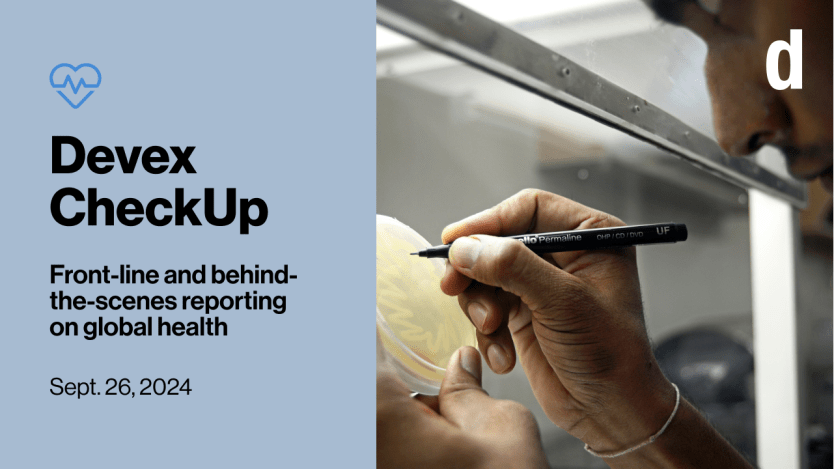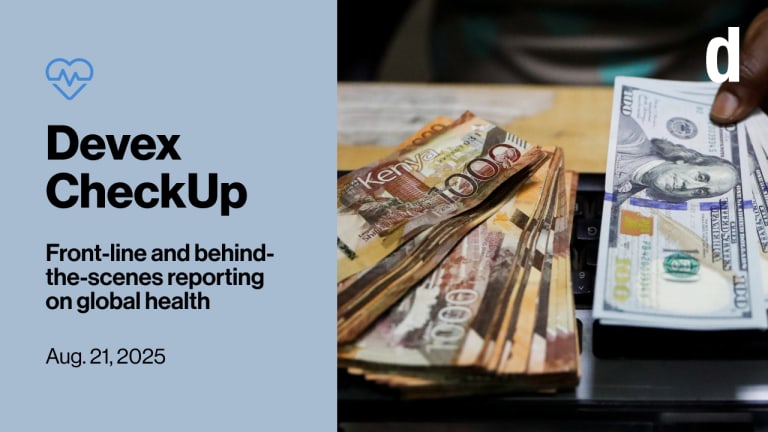
The world is dealing with multiple massive crises. But for Barbados Prime Minister Mia Mottley, antimicrobial resistance, or AMR, is one of the biggest issues it can’t neglect.
“The world needs to pause and get a few things right, and AMR is one of those things at the center of it,” she said during an AMR event on the sidelines of the U.N. General Assembly last Sunday.
This is a preview of Devex CheckUp
Sign up to this weekly newsletter for exclusive global health news and insider insights in your inbox every Thursday.
According to Mottley, the political declaration from this year’s high-level meeting has the potential to get people to recognize AMR as a global threat. And while the $100 million by 2030 in funding envisaged by the draft resolution is “absolutely modest and insufficient,” she said it sends a signal of the need to tackle the problem for “the economic stability of the world.”
Some of that financing could come from the private sector, particularly the pharmaceutical companies that “make extraordinary profits,” she said.
It’s a win-win approach, she said, “unless those who own the shares or benefit as managers in the pharmaceutical companies, like the ones in oil and gas, know of another planet to live on, or know of another way to sustain human civilization.”
In 2020, several pharma companies launched the AMR Action Fund for the development of new antibiotics. However, experts say funding should also go to interventions to mitigate the spread of AMR.
Studies and analyses published in the lead-up to the high-level meeting contained one overarching message: AMR is going to get worse and kill millions more if the world fails to address it. A study in The Lancet forecasts that from 2025 to 2050, 39.1 million deaths will be directly attributable to AMR, with an additional 169 million deaths associated with it.
A main issue driving AMR is the overuse and misuse of antibiotics. But the problems run deep, particularly in many lower-income settings: Poor surveillance, lack of diagnostic tools, lack of access to clean water and sanitation, poor infection prevention and control in hospitals, and the limited availability of basic drugs in the public health system that leads individuals to seek last-resort antibiotics.
Many countries have developed national action plans to combat AMR since the first high-level meeting in 2016. However, by 2022, only about 10% of countries had allocated budgets to implement their plans.
Mirfin Mpundu, the director of ReActAfrica, tells Devex contributing reporter Catherine Davison that countries need to coordinate across sectors to address the problem. And it should be backed politically, legally, legislatively, and financially. If not, then “we will not go anywhere. We will be back in the next five years and hoping for another resolution.”
Some are already concerned about what happens next.
“What I worry about is that it will fall off the agenda straight after the meeting, and it shouldn't,” Dame Sally Davies, U.K. special envoy on antimicrobial resistance – whose own goddaughter died due to AMR – said during a Devex event on the sidelines of UNGA.
Read: Will the UNGA meeting on AMR deliver results for the global south?
Read more: Antimicrobial resistance is a 'solvable problem,' but needs momentum
One big number
$500 million
—That’s the minimum amount the U.S. government has committed to African countries to respond to the current mpox outbreak, U.S. President Joe Biden announced during UNGA. He called on governments, charities, and businesses to match the U.S. pledge and raise the total commitment to $1 billion, well above Africa CDC’s estimated need of $600 million.
In addition to the funding, Biden also pledged to provide up to 1 million mpox vaccine doses. So far, the U.S. has donated 10,000 doses to Nigeria, and 50,000 doses to the Democratic Republic of Congo, the epicenter of the current outbreak. Next up will be 300,000 doses to “be available immediately for disbursement in coordination with Gavi, the Vaccine Alliance and the WHO Access and Allocation Mechanism,” according to a U.S. government fact sheet.
Separately, the Global Fund to Fight AIDS, Tuberculosis and Malaria approved Uganda’s request to reinvest $850,683 of its grant to enhance the country’s capacity to deal with mpox. Part of the funding will support diagnostics through wastewater surveillance.
The Pandemic Fund also approved $128.89 million on Thursday to support Burundi, DRC, Djibouti, Ethiopia, Kenya, Rwanda, Somalia, South Sudan, Sudan, and Uganda in their mpox response. The allocation is part of the Pandemic Fund’s second call for proposals — which the fund decided to increase from $500 million to $547.4 million — but has been fast-tracked to help stem the current outbreak. The rest of the funding allocations will be decided by the board in October.
The mpox emergency also spurred a new coalition, including several G7 development finance institutions, the European Investment Bank, and the International Finance Corporation, which signed a memorandum of understanding Tuesday for the Surge Financing Initiative for Medical Countermeasures. It will focus on funding “the procurement, production, and distribution of vaccines, therapeutics, diagnostics … for low- and lower-middle-income countries,” according to the announcement.
ICYMI: What you need to know about mpox vaccines (Pro)
+ Not yet a Devex Pro member? Start your 15-day free trial today to access all our expert analyses, insider insights, funding data, exclusive events, and more.
Talk of the pox
Your next job?
Manager, External Affairs
TB Alliance
New York City; Washington, D.C.; or Remote
So far this year, 15 countries in Africa have reported more than 6,000 confirmed mpox cases and 32 deaths, most in the DRC. That’s likely an underestimate, with more than 29,000 suspected cases on the African continent, but testing is a challenge. In the DRC, testing materials have been out of stock for weeks.
Join us on Oct. 3 for a Devex Pro Live event on the subject. Officials and experts involved in the mpox response will be joining my colleague Sara Jerving to discuss successes and difficulties, including on surveillance, public health messaging, vaccine preparedness, and funding. Save your spot now!
Better safe than sick
COVID-19’s origins still remain a mystery more than a year after WHO declared that it’s no longer a public health emergency. One of the lingering questions is whether it could have originated from a lab leak in China.
That has given rise to conspiracy theories — but for public health professionals, it’s also made clear the importance of lab safety and security. The Coalition for Epidemic Preparedness Innovations is putting measures in place to avoid accidents or deliberate misuse of science through the launch of its Biosecurity Strategy on the sidelines of UNGA.
CEPI oversees a $3.1 billion research portfolio in over 50 countries, where oversight practices for managing biosafety and biosecurity risks vary significantly. The strategy aims to ensure that the research it supports doesn’t lead to the next accidental or deliberate incident.
Read: CEPI launches ambitious biosecurity strategy at UNGA
Take 5
We’ve been talking a lot about what’s happening this week, but we’re also looking into the future at what may be causing seismic shifts in global health in the coming years. Our new downloadable report goes through five such innovations specific to global health, explaining how they work, and why they might mean so much.
One of the five? Monoclonal antibodies. To find the rest, Devex Pro members can lay eyes on the whole report.
Download your copy: 5 innovations in global health (Pro)
What we’re reading
Gavi is exploring the use of vaccine bonds as a funding mechanism to aid its replenishment efforts. [Financial Times]
Extensively drug-resistant typhoid — also known as XDR-typhoid — is spreading in Pakistan, where more than 15,000 cases have been reported. [The Bureau of Investigative Journalism]
Sudan has been riven by conflict — and now it’s also afflicted by cholera, with 13,000 cases and 388 people dead over the past two months. [ABC News]








